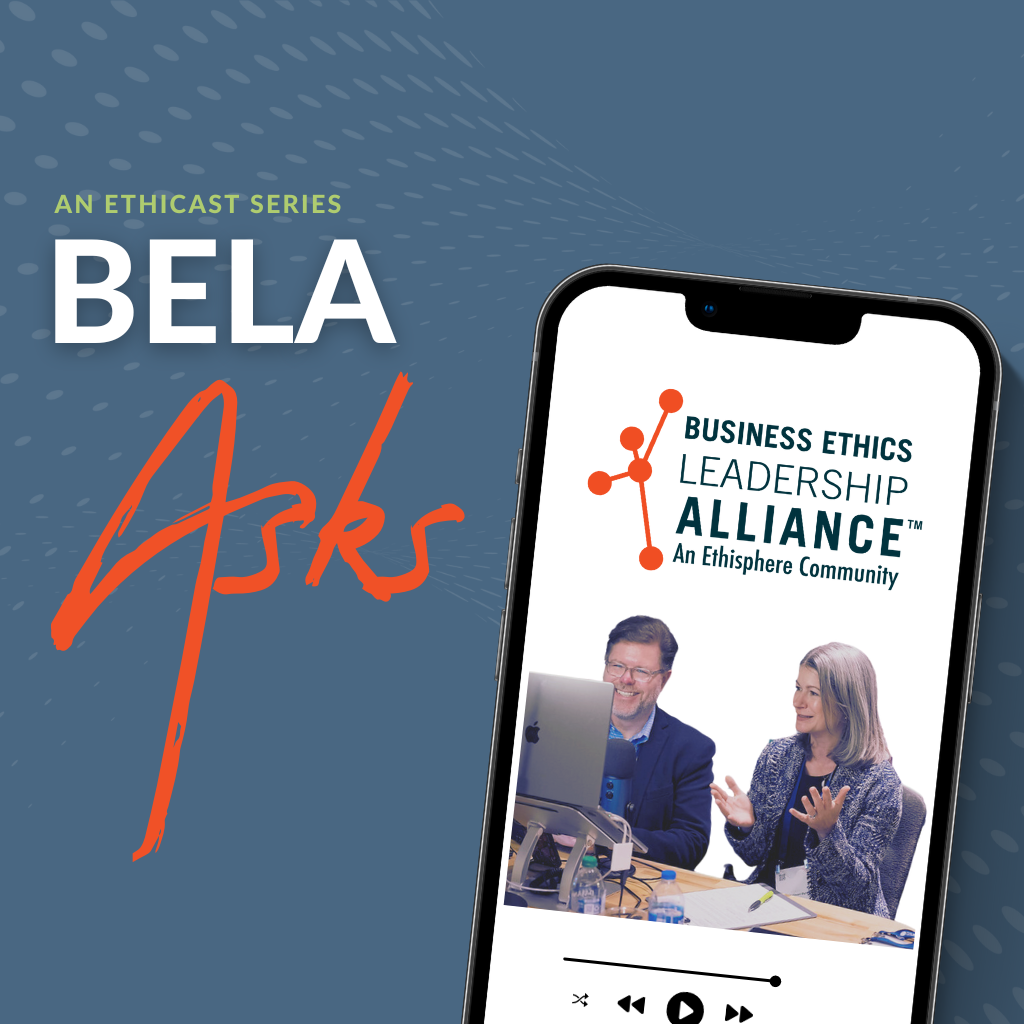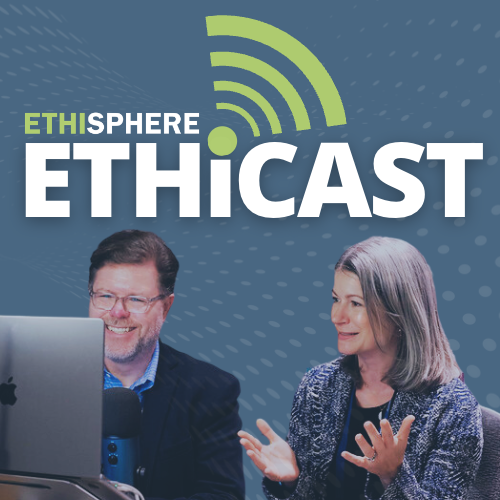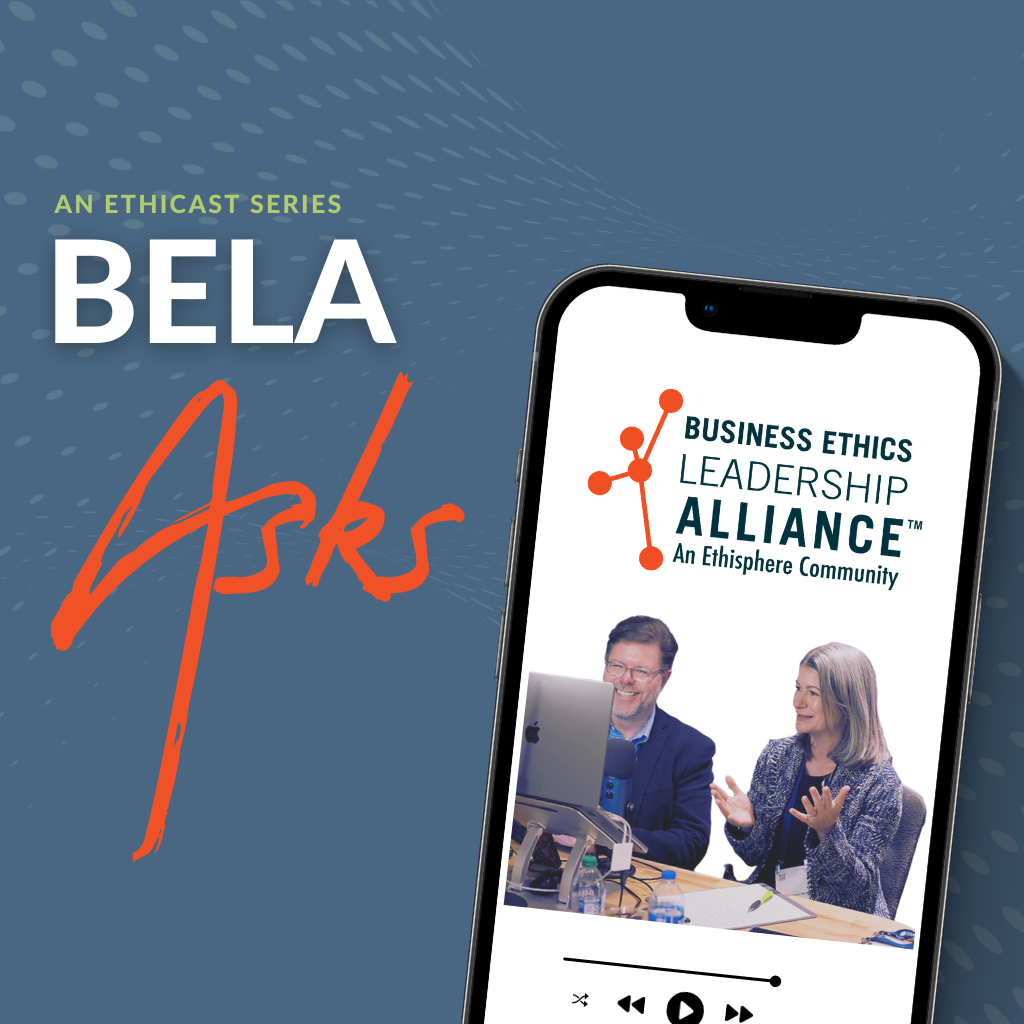Episode Transcript
[00:00:00] Speaker A: Hi everyone. In this episode, we're going to discuss the finer points of organizational justice and why it matters so much to your organization's culture of ethics. I'm your host, Bill Coffin, and this is the Ethicast.
Ethisphere has identified eight pillars that form the foundational elements of a strong ethical culture. They are awareness of the ENC program and resources, perceptions of the function, observing and reporting misconduct, pressure, organizational justice, management or supervisor perceptions, perceptions of leadership and perceptions of peers and environment.
Each of these has a particular role to play in the overall ethical health of an organization, and they are all intrinsically interconnected, forming a kind of ethics ecosystem. But one of these, organizational justice, is especially interesting because there's a certain subjectivity to it. It examines whether employees believe the company holds wrongdoers accountable and communicates disciplinary guidelines effectively. When we talk about Speak up culture, the effectiveness of the ethics and compliance program, the power of values based leadership, and more, these things often connect directly back to organizational justice. With us today to take a closer look at this topic is Malte Held, a culture analyst on the Ethisphere Data and Services team. Malta works with global organizations to enable them to understand and advance a culture of compliance through Ethisphere's culture Assessment and analysis. Malta, welcome to the Ethicast. I'm looking forward to our conversation today.
[00:01:36] Speaker B: Yeah, hi Bill. Thank you so much for having me. Really excited about this.
[00:01:39] Speaker A: One of those eight pillars of an ethical culture. You and I have spoken a lot about this fifth pillar, organizational justice, which I know you have described to me as being particularly interesting and compelling. Can you unpack that for us? I'd love to hear why this particular pillar is of such interest to you.
[00:01:54] Speaker B: Yeah, absolutely.
I think it's so compelling to me because it's so human. In my opinion, organizational justice is probably our most subjective pillar.
There's nothing you can point to, no training certificate or policy acknowledgement to prove it exists.
It's not something you can touch, but it is something you feel.
And because of that, people experience it very differently.
And that's what makes it so complex.
People across all different cohorts by gender, race, seniority, often feel fairness very differently.
For example, I took a look at how seniority has affected pillar 5 scores using our 2024 and 2025 data from our surveys.
And in that I found that individual contributors score 11 percentage points lower than C suite leaders on this pillar and about 7 percentage points lower than VPS.
[00:03:06] Speaker A: A big part of organizational justice is trust, which is often said to be hard to build and easy to break.
Have you seen anything in Ethisphere's culture data that really underscores that point?
[00:03:16] Speaker B: I feel like this pillar behaves like really any human relationship.
Trust builds slowly and one bad experience can undo months or even years of progress. When we look at data on our repeat clients, we see that from year one to year two, organizational justice scores increase by just over a percentage point on average, which is modest progress and actually on the lower end compared to most other pillars.
But when we look at year one to year three, those same questions average nearly four, four percentage points higher.
Now for the data listeners.
Interesting. Interestingly, the mean change between year one and year three is much lower than the average.
And what this tells me is that of those organizations, a portion of them have really figured it out and have learned how to gain trust from their employees, while others might have high scores to begin with or are still working on building that trust or have not prioritized this pillar.
But what this data also tells us is that trust really doesn't grow in leaps. It compounds slowly through consistent actions.
Trust isn't built through one big program. It's built through a thousand consistent decisions.
[00:04:43] Speaker A: That subjectivity around organizational justice and around trust that you mentioned before, how much of an effort, how much of an impact rather would you say that really plays into just the inherently incremental nature of trust increasing within an organization?
[00:04:58] Speaker B: Yeah, I think that's a good point. I think the subjectivity is also what makes it so fragile.
One instance of perceived unfairness, maybe a high profile leadership investigation that's seen as handled poorly, can really ripple through other parts of the culture.
In cases like that, we often not only see dips in organizational justice, but also in leadership and speak up scores.
Because if employees don't believe the organization applies the rules evenly, why would they speak up?
So when trust cracks here, it really doesn't just affect one pillar, it affects the entire ecosystem of culture. I think one thing I want to add here though, is that there is also an opportunity if something within an organization happens and is dealt with properly without really having to get to a point of creating massive amounts of external publicity.
You might see scores in these pillars increase as employees feel empowered to speak up and, you know, trust the system.
[00:06:13] Speaker A: Given your unique perspective on our culture data, can you share some examples of organizations where, like you said, that culture data shows a drop in organizational justice following like a major breach of trust?
[00:06:26] Speaker B: Yeah, we've definitely seen that pattern. I think when, when organizations face public investigations or leadership misconduct issues or Even financial crises, the data can certainly reflect it in those moments. Organizational justice take tends to take one of the steepest declines, often alongside Speak up and leadership.
I have found and seen a few examples where organizational justice took upwards of a 10 percentage point decline in the organizational justice pillar as organizations underwent these challenges.
And what's striking is really how long it takes an organization to rebound from that.
Right.
Trust doesn't recover with a single announcement or leadership change.
It really takes account. It takes accountability, consistency and visible fairness over time.
People really don't judge fairness by the policy, they judge it by the people that enforce it.
[00:07:41] Speaker A: When you talk about, you've seen instances where organizational trust can take an up to 10 point hit following, you know, a major investigation or a major, you know, breach in leadership behavior, that sort of thing. I'm reminded of, you know, earlier in this conversation you talked about how on average, you know, you're seeing organizations making like a single point increase in trust and organizational justice over time. And this sounds like you can see a possibility where if you have a really, really bad incident, you take a 10 point drop in organizational justice, you may be looking at like a 10 year road back to where you were before. Is that, is that an accurate read on things?
[00:08:16] Speaker B: I mean it, it certainly could be. I think this goes back to the data we talked about earlier with the standard deviation. I think there are some organizations that really have figured it out and are really able to compound on, on the ability to gain that trust.
And I think a lot of that comes from being transparent.
An organization that is transparent helps all employees feel like they have the ability to speak up and trust those that are running those processes. But I also wanted to, to kind of go back and look at those 11 and 7 percentage point differences between C suite and BPS.
We really don't have a single concrete answer as to why there are those gaps.
But I think a big part of it is that leaders have more visibility into the why behind decisions.
Things like investigations, disciplinary actions and business context. Right. And with that insight, decisions feel fairer to them.
But going back to the individual contributor who don't see all those moving parts, decisions can look quite inconsistent or biased, even if the process was fair.
And here's kind of where it gets interesting.
Most employees will actually never be a part of an investigation. Right? But it means their perception of fairness is mostly secondhand shaped by what they hear from others or by the organization's reputation for doing the right thing.
So for most people, as you said, organizational justice really is a proxy for trust.
[00:10:27] Speaker A: Organizational justice seems like an aspect of culture where the stronger it is and the more it works, the more invisible it becomes. Do you see any particular challenges or opportunities that this presents to ethics compliance leaders as they prove the value of their program or as they communicate the merits of organizational justice measures to employees?
[00:10:45] Speaker B: Yeah, it's true.
When justice is working, it does feel quiet.
And that can make it hard for ethics and compliance leaders to prove progress because there's nothing tangible tangible to hold up, as we discussed earlier.
But that invisibility is actually a good sign.
My advice to leaders is don't give up just because you don't see obvious results or data change from one year to the next.
Trust doesn't build overnight.
It's it's like a savings account, small consistent deposits that grow over time.
You may not notice it month to month, but you will over the years.
Even though it's invisible, when it's healthy, it's still important to communicate it as well.
Leaders can narrate fairness.
They can explain processes, be transparent on how decisions are made, or share when accountability happens. Obviously anonymously, but that's really how you make the invisible visible.
[00:12:01] Speaker A: Well, Malpa, this has been a fascinating conversation. Thank you so very much for sharing your insights and your findings with us today.
[00:12:07] Speaker B: Yeah, thank you so much for having me.
You know, it's been a great conversation. I truly believe that organizational justice is the heartbeat of ethical culture.
It's not about being perfect, it's about being consistent.
If employees believe their organization will do the right thing even when no one's watching, that's when trust becomes part of the DNA.
[00:12:36] Speaker A: To learn more about how Malta and his colleagues within Ethisphere's Culture team can help your organization measure and analyze the strength of your organization's culture, please visit ethisphere.com solutions Ethisphere has just published its latest report, AI and Ethics and Compliance Risk to Manage Tool to Leverage, which features an overview of AI regulatory trends, AI governance best practices, and use cases from ENC leaders at Cargill, Palo Alto Networks and Verisk, who are all integrating AI into their team's daily work. To get your free copy of this report, please visit ethisphere.com thanks for joining us. We hope you've enjoyed the show. For new episodes each week, subscribe to us on YouTube, Apple Podcasts and Spotify. And if you don't mind, please follow at the sphere on LinkedIn as well. Every like comment and share helps us in our mission to make the world a better place by advancing business integrity.
That's all for now. But until next time, remember, strong ethics is good business.


